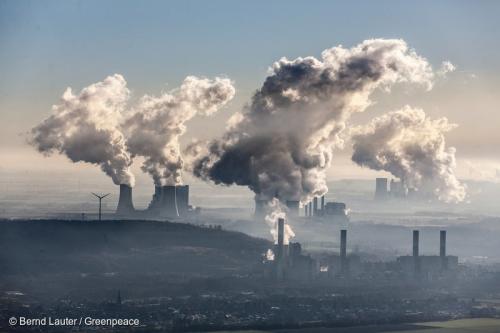European Parliament committee restricts controversial subsidies to coal, gas and nuclear plants
The European Parliament’s energy committee has proposed restrictions for controversial subsidies for energy utilities in its vote on the energy market reform. So-called capacity mechanisms - national subsidies to keep power plants on standby - would only be allowed as a “last resort” and would be heavily regulated.
On February 21, Sebastian Mang, Greenpeace EU energy policy adviser, said: “Today common sense has won over cronyism. While many governments are trying to prop up failing energy companies with massive handouts, the Parliament recognises the power of renewables and that taxpayer money should not be wasted on old, polluting power plants. This energy reform must be an investment in our future and empower the millions of Europeans eager to combat climate change and produce their own energy.”

The committee demanded an EU-wide evaluation of supply and demand. In case of energy security concerns, countries would be required to address shortfalls by increasing renewables, energy efficiency and the number of interconnectors. It also included strict time limits for standby payments and endorsed the Commission proposal to end such payments in 2025 for any plants emitting over 550g of carbon dioxide per kilowatt hour, which would exclude coal. These changes would require countries to remove or reform existing capacity mechanisms, such as the recently approved Polish mechanisms that could cost Polish taxpayers over 8.9 billion euros by 2030.
Unlike the Council, the committee supported the Commission proposal to empower European citizens in the energy sector, for example by maintaining the rule that energy from small-scale renewables be taken up by the grid before energy from other sources such as coal and nuclear (priority dispatch). The committee also wants to make it easier for people to generate and share electricity in their communities.
The committee negotiator, MEP Krišjānis Kariņš (EPP), also received the mandate to begin negotiations. Trialogue negotiations between the Council, Commission and European Parliament on new energy rules are expected to start at the end of March.
On 18 December 2017, in its preliminary position on the energy reform, the Council rejected requirements for national governments to justify capacity mechanisms. Ministers also proposed to extend the deadline from 2025 to 2035 for giving such payments to existing coal plants that emit over 550g of carbon dioxide per kilowatt hour.
Source: Greenpeace European Unit
- 397 reads
Human Rights
Fostering a More Humane World: The 28th Eurasian Economic Summi

Conscience, Hope, and Action: Keys to Global Peace and Sustainability

Ringing FOWPAL’s Peace Bell for the World:Nobel Peace Prize Laureates’ Visions and Actions

Protecting the World’s Cultural Diversity for a Sustainable Future

Puppet Show I International Friendship Day 2020

